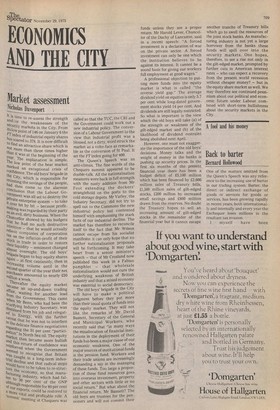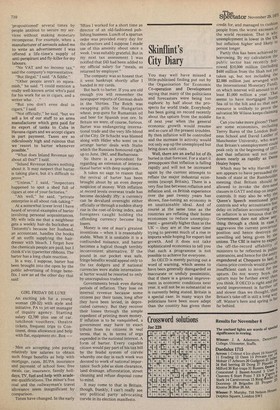A fool and his money
Back to barter
Bernard Hollowood
One of the matters omitted from the Queen's Speech was any reference to the increasing use of barter in our trading system. Barter, the direct or indirect exchange of goods or services for goods or services, has been growing rapidly in recent years, both internationally and internally and every year the Exchequer loses millions in the resultant tax evasion.
myself have been 'propositioned' several times by people anxious to secure my services without making monetary recompense. For example, when a manufacturer of aerosols asked me to write an advertisement I was offered a life-time's supply of anti-perspirant and fly-killer for my labours.
"No VAT and no income tax," said the company's representative.
"But illegal," I said. "A fiddle."
"Other people aren't so squeamish," he said. "I could mention a really well-known artist who's paid for his work for us in cigars, and a writer who . .
"But you don't even deal in cigars," I said.
"Not officially," he said, "but we sell a lot of our stuff to an arms manufacturer which gets paid for its export of tanks to Cuba in Havana cigars and we accept cigars in part payment. Taxes are so ridiculously high and ruinous that we 'resort to barter whenever possible."
"What does Inland Revenue say about all this?" I said.
"Inland Revenue knows nothing about it. It may suspect that barter is taking place, but it's difficult to prove."
"Unless," I said, "inspectors happened to spot a shed full of cigars at one of your factories."
"A h well," he said, "private enterprise is all about risk-taking."
At a somewhat lower level I have heard of several examples of barter involving personal acquaintances. My wife tells me that a neighbour gets a weekly hair-do buckshee at Tintoretti's because her husband, an accountant, handles the books of an outfit supplying the hairdresser with bleach. I forget how the chemicals people are paid, but I think it's in typewriter ribbons. The barter has a long chain reaction.
In a way, I suppose, barter has been brought into the open by the public advertising of fringe benefits. I saw an ad the other day that said: GIRL FRIDAY DE LUXE An exciting job for a young woman (20-32) with style and initiative. PA to jet-set manager of inquiry agency. Starting salary £2,700 plus use of car, luncheon vouchers, theatre tickets, frequent trips to Continent, dress allowance and help with flat, equipment etc. Box - • Men are accepting jobs paying relatively low salaries to obtain such fringe benefits as help with mortgage, rates, BUPA insurance and payment of school fees; free meals, car, insurance, family holidays, TV, fuel and help with academic qualifications. The miner's free coal and the railwayman's travel allowance seem insignificant by comparison.
Times have changed. In the early 'fifties I worked for a short time as director of an old-fashioned publishing business. Lunch of a spartan order was provided every day for the directors and I suppose I made use of this amenity about once a week. I was suitably grateful. But in my next tax assessment I was notified that £43 had been added to my official salary for "meals, as returned by employer."
The company was so honest that it went bankrupt shortly after I handed in my cards.
But back to barter. If you are old enough you will remember the newspaper reports of German deals in the 'thirties. The Reich was swapping pills for Hungarian wheat, pop-guns for Rumanian oil and beer for Spanish iron ore. In Britain we were, of course, furious. Barter was endangering international trade and the very life-blood of the City. Dr Schacht was blamed along with Hitler who went on to arrange barter deals with Stalin which the Russians honoured right up to June, 1941, and Barbarossa.
So there is a precedent for regarding an extension of international barter with deep suspicion.
It takes no sage to reason that the revival of barter has been brought about by an even deeper suspicion of money. With inflation at record levels overseas trade has become decidedly iffy: a currency can be devalued overnight either officially or through a sudden sharp rise in the cost-of-living index, and foreigners caught holding the offending currency become big losers.
Money is one of man's greatest inventions — when it is reasonably stable. When it is unstable it is a confounded nuisance, and barter becomes a logical though terribly inconvenient alternative. If the pound in our pocket was safe, fringe benefits would appeal only to the tax dodgers and if national currencies were stable international barter would be resorted to only by unscrupulous traders.
Governments break even during periods of inflation. They lose on internal revenue because some citizens pay their taxes, long after they have been levied, in depreciated currency. But they recover their losses through the simple expedient of printing more money. If inflation is to be vanquished, a government may have to exact tribute from its citizens in real terms, that is, in terms of ergs expended in the national interest. A form of barter. Every capable citizen would pay part of his tax bill by the feudal system of corvee whereby one day in each week was devoted to work of national importance. Such jobs'as slum clearance, land drainage, afforestation, street cleaning and refuse disposal come to mind.
It may come to that in Britain, though, frankly, I can't really see any political party advocating corvee in its election manifesto.



































 Previous page
Previous page